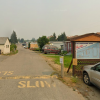B.C. is in the midst of a heat wave, with 34 communities breaking temperature records on Saturday, so it’s important to be careful about your own body heat.
Heat-related illness is when your body gains heat faster than it can cool itself down. This type of illness can almost always be prevented, but it leads to weakness, disorientation, and exhaustion. Severe cases can lead to heat stroke, also known as sunstroke. Heat stroke is a serious and life-threatening medical emergency.

Not surprisingly, the effects of heat are worse if you’re not drinking enough to stay hydrated.
Usually, a healthy human body stays around 37°C . When that temperature rises, your body releases the heat through sweating and blood flow to the skin, allowing the body to cool. Heat-related illness, however, comes when your body can’t properly cool itself down in hot environments or during intense physical activity.
How can you tell if you have heat-related illness? There’s a variety of mild to severe symptoms, including:
- pale, cool, moist skin;
- heavy sweating;
- muscle cramps;
- rash;
- swelling, especially hands and feet;
- fatigue and weakness;
- dizziness and/or fainting;
- headache;
- nausea and/or vomiting;
- fever, particularly a core body temperature of 40°C (104°F) or more;
- confusion and decreased mental alertness;
- hallucinations;
- red, hot, dry skin (in the late stages of heat stroke);
- seizures; and
- unconsciousness/coma.

Those at higher risks are young children under four, those 65 years or older, or healthy people who do lots of physical activity or work in a hot environment. Other factors for increased risk are:
- increased body mass;
- drinking too much alcohol or caffeine;
- chronic illnesses such as uncontrolled diabetes or hypertension, heart failure, emphysema, kidney failure, colitis, mental health issues, and cystic fibrosis;
- certain medications such as diuretics or water pills, and certain psychiatric medications;
- previous heat stroke;
- exercising or working in hot weather;
- being unable to find a place to cool down; and
- not drinking enough water during hot weather.

Now, what can you do to reduce the risk?
- Never leave children alone in a parked car, as temperatures can go from 34°C to 52°C in only 20 minutes. Leaving the windows slightly open WILL NOT keep the temperature at a safe level.
- Drink lots of fluids, especially when you’re active on a hot day. Drink water even before you’re thirsty.
- Stay indoors in air-conditioned buildings or take a cool bath or shower. Fans alone may not be enough if it’s 30°C or hotter, and though sunscreen protects against UV rays, it doesn’t protect against heat.
- Try to be outside before 11 a.m. or after 4 p.m., when the UV radiation is the weakest.
- Avoid tiring work or exercise in hot environments. If you have to do it, drink two to four glasses of non-alcoholic fluids each hour. Make sure to take rest breaks in the shade
- Avoid sunburn and slap on that sunscreen
- Wear lightweight, light-coloured, and loose-fitting clothing as well as a brimmed hat or umbrella
- Keep checking other people for the signs of heat-related illness and make sure they’re keeping cool and drinking their fluids.

Finally, what can you do if someone has mild heat-related illness? Some home treatments are:
- Moving somewhere cooler
- Drinking lots of non-alcoholic fluids
- Resting
- Taking a cool bath or shower
- Wearing lightweight clothing
If symptoms last longer than one hour, or if they change, worsen, or cause you concern, talk to a health care provider. Mild heat exhaustion doesn’t change mental alertness, so consult a health care provider if someone who has been in the heat, has been exercising, or has been working in the heat has a change in mental alertness.

Remember that animals can get heat stroke too. Don't leave your pet in a parked car, and check out these signs of heat stroke in pets.
And now you have the information you need about heat-related illness and heat stroke. Check out HealthLinkBC if you have any more questions.
















